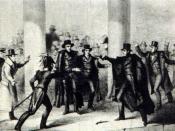INTRODUCTION
The Inchoate or incomplete offence of "Attempt" is not a crime by itself. It is only criminal in relation to a substantive criminal offence. There are two other main Inchoate offences, Incitement and Conspiracy. During this essay we shall discuss crimes of attempt which were subject to common law before the Criminal Attempts Act 1981(CAA), Ch. 47. This was a result, in part, of the Law Commission's Report 102 . The report also recommended changes to the law on "Impossibility". It made particular reference to Haughton & Smith and Nock . S1 (4) of the Act provides that s1 only applies to indictable substantive offences. This essay will critically assess whether the CAA has simplified the law on attempt.
DISCUSSION
Background
Glanville Williams argues that CAA did nothing to change the law and in fact muddied the waters. Under the Common Law there were two main authorities .
Reg v Eagleton .
The court held that provided the act was sufficiently proximate and the accused had carried out the last act that was required of him then an attempt had been made. Acts, which were too remote to the crime, were not to be considered.
Stephen's Digest of the Criminal Law, 5th Ed (1894), art 50.
"An attempt to commit a crime is an act done with intent to commit that crime, and forming part of a series of acts which would constitute its actual commission if it were not interrupted".
These two contrasting authorities led to confusion, unfairness and contradictory decisions. For example Robinson and Stonehouse , both involved insurance fraud. Robinson arranged things to appear as if his Jeweller's shop had been robbed. Stonehouse arranged things to appear that he had drowned whilst swimming. In both cases the "event" which would normally lead to a claim...


